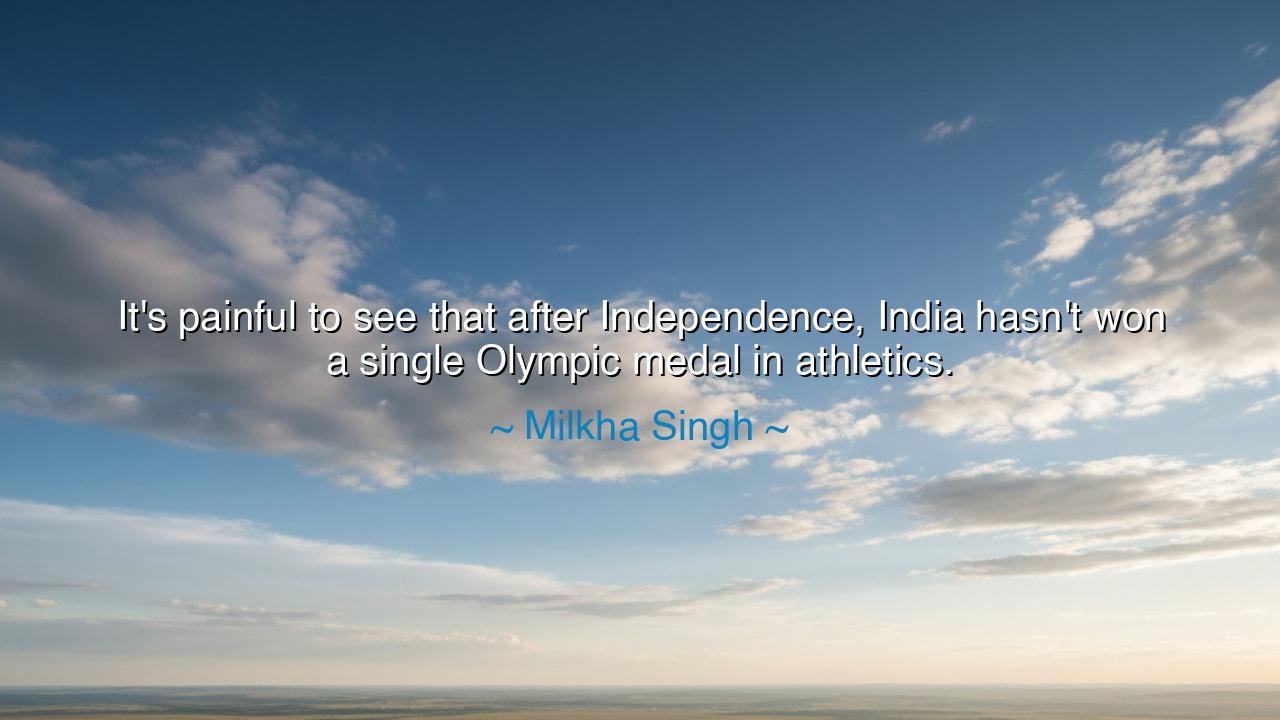
It's painful to see that after Independence, India hasn't won a
It's painful to see that after Independence, India hasn't won a single Olympic medal in athletics.






The legendary Milkha Singh, known to the world as The Flying Sikh, once uttered words that cut deep into the heart of a nation: “It’s painful to see that after Independence, India hasn’t won a single Olympic medal in athletics.” These words, born not of anger but of sorrow and truth, echo the lament of a man who had given his very soul to the track, who had run not only for victory but for the honor of his country. In this one sentence, Milkha Singh expressed the anguish of generations — the grief of potential unfulfilled, of dreams deferred, and of a nation yet to claim its rightful place in the pantheon of sporting greatness.
To understand the depth of this quote, one must understand the spirit of Milkha Singh himself. Born in a land torn by partition, scarred by loss and blood, he rose from the ashes of tragedy to become a symbol of perseverance. He ran barefoot, hungry, and heartbroken, but his will burned brighter than the desert sun. Every step he took was a prayer for his country — a cry that India, newly free, might show the world her strength not only in philosophy and faith, but in human excellence. When he lost the bronze medal by the smallest margin at the 1960 Rome Olympics, it was not only his loss, but the loss of an entire nation yearning for recognition. Thus, when he later spoke of his pain, it was the pain of one who had seen glory within reach, yet watched it slip away — again and again, not only for himself but for his people.
The origin of his statement lies not merely in disappointment, but in devotion. For Milkha Singh believed that Independence was not only political freedom — it was the freedom to excel, to rise, to prove one’s worth on the world stage. To him, every Indian athlete carried the spirit of the nation within them, the same spirit that had won freedom through sacrifice and courage. Yet he saw that the flame was fading, that complacency had crept in where fire should have burned. His words were not condemnation; they were a call — a call to awaken the dormant power of a billion hearts, to remember that victory does not come to those who wait for it, but to those who work relentlessly for it.
In his life, there is a story that shines like a torch in the darkness. After his heartbreak in Rome, Milkha Singh could have surrendered to despair. Yet he did not. Instead, he continued to train, to inspire, to dream for others. When young athletes approached him for guidance, he told them that talent without discipline is like a bird without wings. He believed that India’s struggle was not one of ability, but of commitment — that the body of the nation was strong, but its will was weak. His words were meant to pierce that weakness, to awaken a spirit of excellence and pride.
And indeed, his cry did not vanish into silence. Many years later, India’s long drought in Olympic athletics was broken when Neeraj Chopra hurled the javelin across the sky in Tokyo in 2021, claiming the gold medal that Milkha Singh had long dreamed of. Though Milkha had passed away just weeks before that moment, his spirit was there — running once more, rejoicing in the triumph of a new generation. His pain had been turned into prophecy; his dream, though delayed, had at last been fulfilled. The gold that glistened that day was not only for one man, but for every runner, every dreamer, every Indian who had refused to give up.
But the meaning of his quote endures beyond that victory. For Milkha’s words were never merely about medals — they were about national character, about the hunger to excel and the discipline to pursue greatness. His pain was the pain of a teacher whose students have forgotten their lessons; his hope, that they would one day remember. He wanted India to see that the race is not against others, but against mediocrity, against apathy, against the belief that greatness belongs only to others. His lament was, in truth, an invitation to rise.
Let this be the lesson for generations to come: freedom alone does not bring greatness — effort does. Independence is the starting line, not the finish. To honor Milkha Singh’s words is to take up his mantle — to strive, to sweat, to dream fiercely, and to never be content with less than one’s best. Whether on the track, in the field, in the arts, or in the soul, each of us runs our own race — and each victory, however small, strengthens the spirit of the nation.
So let every heart remember the Flying Sikh’s cry — “It’s painful to see…” — not as despair, but as a sacred challenge. Let us turn his pain into pride, his dream into duty. For in every Indian heart beats the rhythm of a runner — and as long as that rhythm endures, the race is not lost. The torch has been passed; may we run with it, until the world sees not our struggle, but our triumph.






AAdministratorAdministrator
Welcome, honored guests. Please leave a comment, we will respond soon